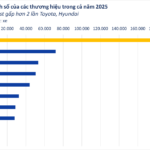On November 21, in Hanoi, the Department of E-Commerce and Digital Economy, in collaboration with the Department of Industry, Electricity, and Renewable Energy of the Ministry of Industry and Trade, organized the 2024 Industry and Trade Digital Transformation Forum with the theme “Promoting Digital and Green Transformation for Sustainable Development.”

Traditional markets have been quiet recently
In his opening speech at the forum, Deputy Minister of Industry and Trade Truong Thanh Hoai, assessed that e-commerce (EC) and Vietnam’s digital economy continue to be one of the bright spots in socio-economic development.
According to the report “Southeast Asia Digital Economy in 2024” published by Google – Temasek on November 5, the scale of Vietnam’s Internet economy is estimated to reach 36 billion USD this year, up 16% from last year.
Retail e-commerce remains the pillar, contributing 22 billion USD, up 18% over the same period and accounting for 61% of the total scale of the Internet economy.
“In 2024 and the following years, with such strong growth momentum, Vietnam’s e-commerce and digital economy market will continue to grow strongly and become one of the driving forces for economic growth,” predicted the Deputy Minister of Industry and Trade.
According to Deputy Minister Truong Thanh Hoai, this is also the time to build new models and strategies, strongly applying digital technology to increase the competitiveness and resilience of businesses and organizations in the new context.
Meanwhile, Mr. Tran Minh Tuan, Director of the Digital Economy and Digital Society Department (Ministry of Information and Communications), informed that an average Vietnamese consumer shops online four times a month.
Vietnam has more than 1.4 million grocery stores, 9,000 traditional markets, 54,008 retail businesses, and 208,995 wholesale businesses.
However, traditional wholesale and retail will not be able to survive due to low competitiveness and limited market access; unable to compete with other localities or surrounding countries.
According to the Director of the Digital Economy and Digital Society Department, the development of cross-border e-commerce, such as Temu, Shein, etc., “invading” the Vietnamese market has led to many retail stores closing and many traditional markets struggling to compete.
Recently, the Ministry of Information and Communications, in coordination with the Ministry of Industry and Trade, evaluated the digital transformation of wholesale and retail businesses.
Specifically, an evaluation in Phu Nhuan District, Ho Chi Minh City, with 200 retail businesses and households, showed that only 3.5% of businesses and households have digitally transformed.
“If they do not quickly transform digitally, businesses and households will lose the traditional market,” warned Mr. Minh Tuan.
The E-commerce Floor and Digital Platforms: A Case for Corporate Income Tax
The government has proposed a new regulation requiring foreign businesses providing goods and services through e-commerce and digital platforms to pay taxes on their taxable income derived from Vietnam. This proposal aims to ensure that foreign enterprises doing business in Vietnam’s digital landscape contribute their fair share to the country’s tax revenue.
Unlocking the Double Transition: Navigating the Financial Packages
International investment funds and banks have piqued their interest and are offering tangible financial packages to encourage Vietnamese businesses to embark on the dual transition. However, the lack of a clear legal and policy framework to assess green projects is hindering the disbursement of these much-needed green funds.
“Vietbank’s Endeavor for Capital Increase: A Commitment to Sustainable Growth”
The State Securities Commission (SSC) has confirmed receiving the necessary documents for Vietbank’s (VBB on UPCoM) stock dividend issuance, aiming to boost its charter capital by VND 1,428 billion. With this capital increase, Vietbank’s charter capital will rise to VND 7,139 billion. This crucial step of finalizing the procedures with the SSC empowers Vietbank to strengthen its financial capabilities and lay the groundwork for expanding its nationwide network.




















